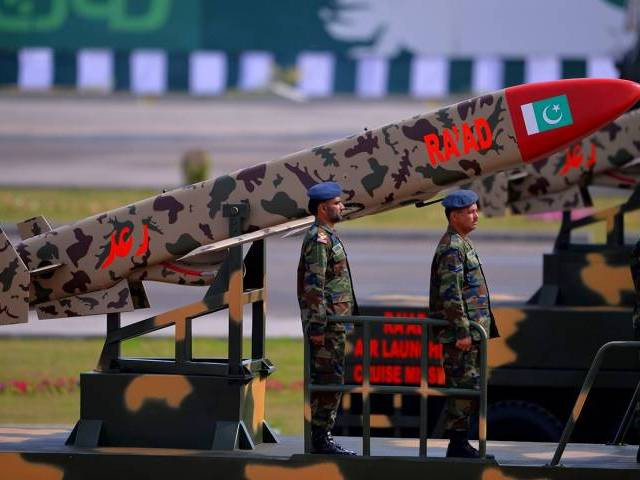‘Nukes enhance nation’s power but not national power of state’
Scholars point out the cost explosions have had on Pakistan, peaceful use of nuclear technology

Pakistan Army soldiers travel on a vehicle carrying cruise missile Ra'ad during the Pakistan Day military parade in Islamabad on March 23, 2016. PHOTO: AFP/FILE
This was stated by speakers while addressing a seminar on “20 years of nuclearisation of South Asia: Technical and Political Dimensions” at the University of Peshawar’s (UoP) International Relations Department, to mark 20 years since Pakistan first announced to the world of its nuclear capabilities.
Institute of Radiotherapy and Nuclear Medicine (IRNUM) Peshawar director Dr Rauf Khattak said that the peaceful use of atomic or nuclear technology was the cornerstone of his field.
He said that institutions such as IRNUM and the Karachi Nuclear Power Plant (KANUPP) were using nuclear technology for peaceful purposes such as medical applications in preventing and fighting cancer.
Khattak dilated that nuclear energy and research was helping power critical medical facilities such as nuclear imagery, X-rays, oncology-radiation and medical physics.
He further said that although institutions such as the Shaukat Khanum Hospital and the Agha Khan Hospital were working for treating cancer patients, around 80 per cent of cancer treatment is carried out by IRNUM and allied hospitals of Pakistan.
UoP International Relations Department Chairperson Prof Dr Syed Hussain Soherwordi said that Pakistan went nuclear in May 1998 in response to India’s nuclear tests.
Providing the background to two explosions Pakistan carried out in the remote Chaghi mountains of Balochistan, nicknamed Chaghai-1 for the first explosion on May 28 and Chaghai-2 for the May 30 explosions, he said that Pakistan had to think about its security.
Noting that the country was under extreme pressure from the US and the world community to not hold the tests, Pakistan had to make decisions for itself by itself, Dr Soherwordi said.
The US, he claimed, had offered Pakistan $6 billion as compensation if it opted against the tests.
Moreover, most economists predicted that the economic fallout from the tests would take a heavy toll on Pakistan.
“In those days, we used to say that those who think about strategic balance from economic perspective think from their tummy,” Dr Soherwordi said. However, Pakistan went ahead and conducted defensive nuclear tests.
IAEA chief impressed by Pakistan’s nuclear safety standards
“It is very important that Pakistan is a nuclear weapon state carrying around 90 to 120 nukes. However, it is directly related to other determinants of national power. Nukes are a part of national power but not the national power of a state,” he said.
Explaining what did determine a nation’s power, Dr Soherwordi pointed out that economy, technology, skilled manpower, strong currency, lower poverty line, youth employment, education, scientific and technological advancement, and national integration are the determinants of a country’s power.
SC concerned over N-power plants near populated areas
“The Soviet Union had thousands of nuclear weapons, but they could not prevent it from disintegrating. Nukes are a guarantee to Pakistan’s security. However, human security is direly needed which may be focused along with many other factors,” he said.
Another challenge, he pointed out, was cybersecurity in the security of nuclear weapons.
Today Pakistan is an established nuclear weapon state. After 20 years from enigma to reality, Pakistan is a secure state in the region, he added.
Published in The Express Tribune, May 28th, 2018.













COMMENTS
Comments are moderated and generally will be posted if they are on-topic and not abusive.
For more information, please see our Comments FAQ